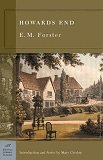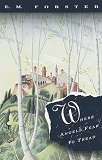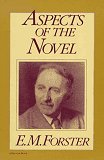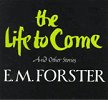
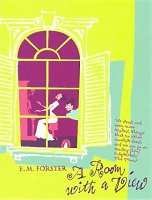 A ROOM WITH A VIEW by E.M. Forster (hier online bestellen)
A ROOM WITH A VIEW by E.M. Forster (hier online bestellen)
If you want to buy this book second hand
- very good condition -,
send me an eMail
The price of it is € 7 incl. postage.
The story:
This Edwardian social comedy explores love and prim propriety among an eccentric cast of characters
assembled in an Italian pensione and in a corner of Surrey, England. A charming young English woman, Lucy
Honeychurch, faints into the arms of a fellow Britisher when she witnesses a murder in a Florentine piazza.
Attracted to this man, George Emerson--who is entirely unsuitable and whose father just may be a
Socialist--Lucy is soon at war with the snobbery of her class and her own conflicting desires. Back in England
she is courted by a more acceptable, if stifling, suitor, and soon realizes she must make a startling decision
that will decide the course of her future: she is forced to choose between convention and passion. The
enduring delight of this tale of romantic intrigue is rooted in Forster's colorful characters, including
outrageous spinsters, pompous clergymen and outspoken patriots. Written in 1908, A Room With A View is one
of E.M. Forster's earliest and most celebrated works.
Excerpt from book:
A few days after the engagement was announced Mrs. Honeychurch made Lucy and her Fiasco come to a little
garden-party in the neighbourhood, for naturally she wanted to show people that her daughter was marrying a
presentable man.
Cecil was more than presentable; he looked distinguished, and it was very pleasant to see his slim figure
keeping step with Lucy, and his long, fair face responding when Lucy spoke to him. People congratulated
Mrs. Honeychurch, which is, I believe, a social blunder, but it pleased her, and she introduced Cecil rather
indiscriminately to some stuffy dowagers.
At tea a misfortune took place: a cup of coffee was upset over Lucy's figured silk, and though Lucy feigned
indifference, her mother feigned nothing of the sort but dragged her indoors to have the frock treated by a
sympathetic maid. They were gone some time, and Cecil was left with the dowagers. When they returned he was
not as pleasant as he had been.
"Do you go to much of this sort of thing?" he asked when they were driving home.
"Oh, now and then," said Lucy, who had rather enjoyed herself.
"Is it typical of country society?"
"I suppose so. Mother, would it be?"
"Plenty of society," said Mrs. Honeychurch, who was trying to remember the hang of one of the dresses.
Seeing that her thoughts were elsewhere, Cecil bent towards Lucy and said:
"To me it seemed perfectly appalling, disastrous, portentous."
"I am so sorry that you were stranded."
"Not that, but the congratulations. It is so disgusting, the way an engagement is regarded as public
property--a kind of waste place where every outsider may shoot his vulgar sentiment. All those old women
smirking!"
"One has to go through it, I suppose. They won't notice us so much next time."
"But my point is that their whole attitude is wrong. An engagement--horrid word in the first place--is a
private matter, and should be treated as such."
Yet the smirking old women, however wrong individually, were racially correct. The spirit of the generations
had smiled through them, rejoicing in the engagement of Cecil and Lucy because it promised the continuance of
life on earth. To Cecil and Lucy it promised something quite different--personal love. Hence Cecil's irritation
and Lucy's belief that his irritation was just.
About the author:
 E. M. Forster (1879-1970) was a noted English author and critic and a member of the Bloomsbury
group.
E. M. Forster (1879-1970) was a noted English author and critic and a member of the Bloomsbury
group.
Edward Morgan Forster was born in London on January 1, 1871 as the son of an architect, who died before his
only child was two years old. Forster's childhood and much of his adult life was dominated by his mother and
his aunts. Forster's years at Tonbridge School as a teenager were difficult - he suffered from the cruelty of
his classmates. Forster attended King's College, Cambridge (1897-1901), where he met members of the later
formed Bloomsbury group. After graduating he travelled in Italy and Greece with his mother, and on his return
began to write essays and short stories for the liberal Independent Review. In 1905 Foster spent several months
in Germany as tutor to the children of the Countess von Armin.
His first novel, Where Angels Fear To Tread appeared in 1905. In the following year he lectured on Italian
art and history for the Cambridge Local Lectures Board. The Longest Journey appeared in 1907 followed by
A Room With A View (1908), based partly on the material from extended holidays in Italy with his mother.
Forster also wrote during the pre-war years a number of short stories, which were collected in The Celestial
Omnibus (1914). Most of them were symbolic fantasies or fables.
Howards End (1910) was a story that centered on an English country house and dealt with the clash between
two families, one interested in art and literature, the other only in business. The book brought together
the themes of money, business and culture. Forster then embarked upon a new novel with a homosexual theme,
Maurice which was revised several times during his life, and finally published posthumously in 1971.
Between the years 1912 and 1913 Forster travelled in India. From 1914 to 1915 he worked for the National
Gallery in London. Following the outbreak of World War I, Forster joined the Red Cross and served in
Alexandria, Egypt. In 1921 Forster returned to India, working as a private secretary to the Maharajah of
Dewas. India was the scene of his masterwork A Passage To India (1924), an account of the country under
British rule. It was Forster's last novel - and for the remaining 46 years of his life he devoted himself
to other activities.
Forster contributed reviews and essays to numerous journals, most notably the Listener and he was an active member
of PEN. In 1934 he became the first president of the National Council for Civil Liberties, and after his
mother's death in 1945, he was elected an honorary fellow of King's and lived there for the remainder of his
life. In 1949 Forster refused a knighthood. He was made a Companion of Honour in 1953 and in 1969 he accepted
an Order of Merit. Forster died on June 7, 1970.
Buchdaten:
A ROOM WITH A VIEW by E.M. Forster
Sprache: Englisch
Taschenbuch - 224 Seiten - Penguin Books
Erscheinungsdatum: 25. Februar 1999
ISBN: 0140282637
Preis: € 11,95
More works from the same author:
zurück zur Übersicht
|
 A ROOM WITH A VIEW by E.M. Forster (hier online bestellen)
A ROOM WITH A VIEW by E.M. Forster (hier online bestellen)
 E. M. Forster (1879-1970) was a noted English author and critic and a member of the Bloomsbury
group.
E. M. Forster (1879-1970) was a noted English author and critic and a member of the Bloomsbury
group.